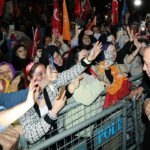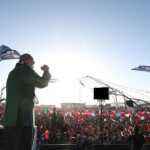For much of the past two decades, Turkey analysts and apologists have tried to draw up analogies. Are the state of bilateral ties as bad as the Iraq War, the Cyprus crisis? The simple fact is there is no longer an analogy for how bad ties are, and how bad they are about to become.
Turkey’s presidential election is heading for a run-off, but the fix is in.
President Recep Tayyip Erdogan will win a second term, solidifying his role at Turkey’s helm for a quarter-century. Pundits who see a silver-lining in a second round forget Iran, where run-off elections are common though they are no marker of democracy.
For months, the State Department has counseled both the White House and Congress to go easy on Turkey. Their logic: Turkey faced an election and any coercion or punitive reaction might play into Erdogan’s hands ahead of yesterday’s polls.
With those elections now in the rearview mirror, and the run-off a foregone conclusion, it is time to recalibrate policy to reality. The United States and Europe should expect a rocky road.
Erdogan is not only Turkey’s most corrupt ruler; he is in competition with Vladimir Putin, Kim Jung-un, Ali Khamenei, Masoud Barzani, and Ilham Aliyev to be the world’s most corrupt person. He began his life as a street urchin. He ran his initial campaigns as mayor upon cleanliness. He left that office with 13 corruption cases hanging over his head. US Embassy documents exposed by Wikileaks reported Erdogan had eight Swiss bank accounts. Parliamentary immunity bought him time, and stacking the judiciary gave him a permanent pass. It is possible that with his newfound sense of impunity, Turkey’s reputed Black Sea hydrocarbon finds and gas looted from Cypriot waters, Erdogan could become the world’s first trillionaire.
The problem is not Erdogan’s corruption, however, but rather Turkey’s dire condition. Erdogan has driven Turkey’s once-promising economy into the ground. Inflation is out-of-control and Turkey’s currency on the precipice of worthlessness. Nothing in Erdogan’s record suggests a man capable of recognizing let alone correcting mistakes.
As war and adventurism drove Iraq into crippling debt, Saddam looked next door—to wealthy Kuwait—to bail him out. In hindsight, US and European diplomats who dismissed Saddam’s rhetoric denying Kuwait’s legitimacy or the sanctity of its borders as normal Arab bombast were fools. The question now before the United States and Europe is whether they will make the same mistake twice: Erdogan openly questions the legitimacy of the Lausanne Treaty. As it nears its centenary, not only his rhetoric but also his actions will become more extreme. Turks have been fed a steady stream of nationalism if not fascism and racial superiority. The Turkish media bubble is as extreme as Russia’s. The Turkish public is primed for both aggression and distraction. The only question is whether Turkey’s target will be Greece, Cyprus, Syria, Iraq, or Armenia.
Erdogan holds the United States in disdain. Expect this to become more acute. As Professor Henri Barkey noted, Erdogan’s favorite newspaper headlined, “The ballot boxes will have an answer for Biden.” Supplication would be a bad strategy, only puffing Erdogan up more. It is time for the White House and State Department to prepare themselves for Erdogan’s manufactured crisis. He is likely to take Americans hostage in order to humiliate America to his constituents and extract concessions, much as Russia, China, Iran, and North Korea do.
For much of the past two decades, Turkey analysts and apologists have tried to draw up analogies. Are the state of bilateral ties as bad as the Iraq War, the Cyprus crisis? The simple fact is there is no longer an analogy for how bad ties are, and how bad they are about to become.
This article was originally published in 19fortyfive.
The views and opinions expressed above are the author’s and do not represent those of the Free Turkish Press.


